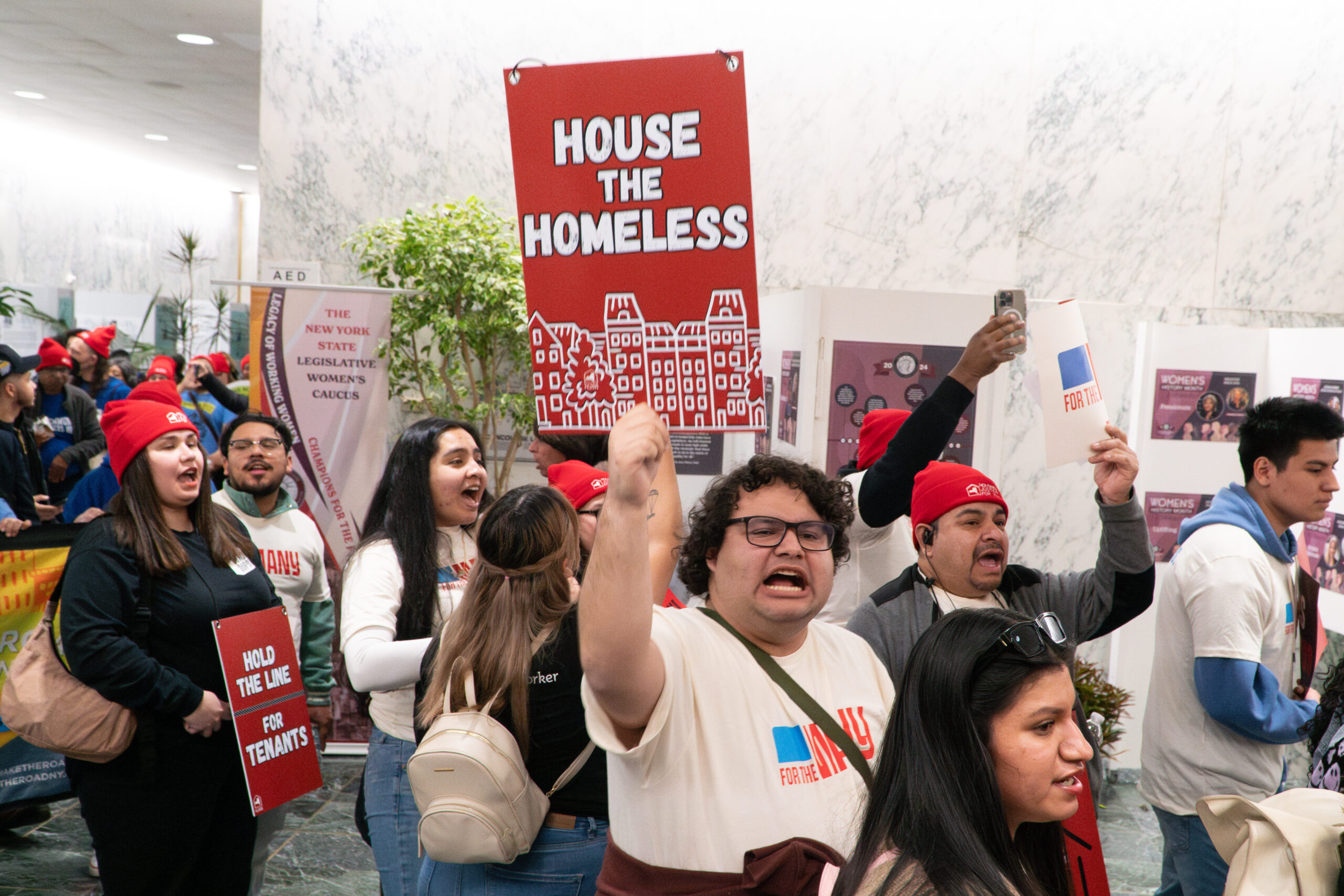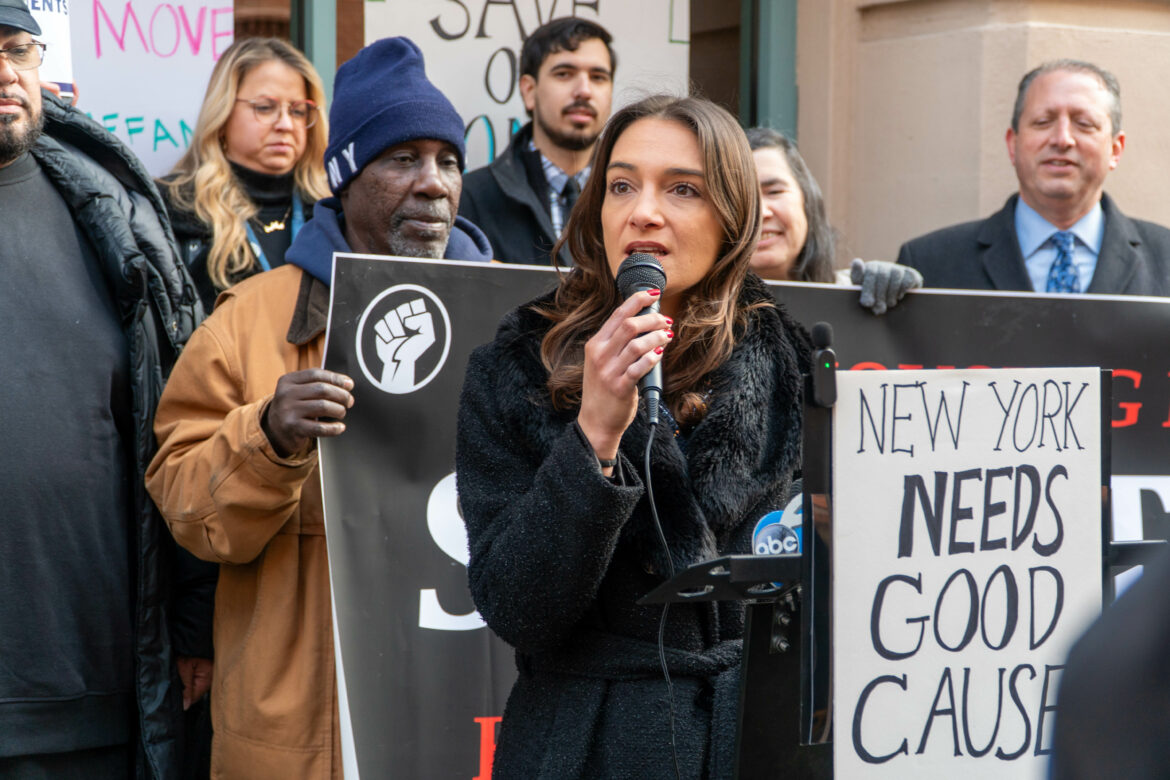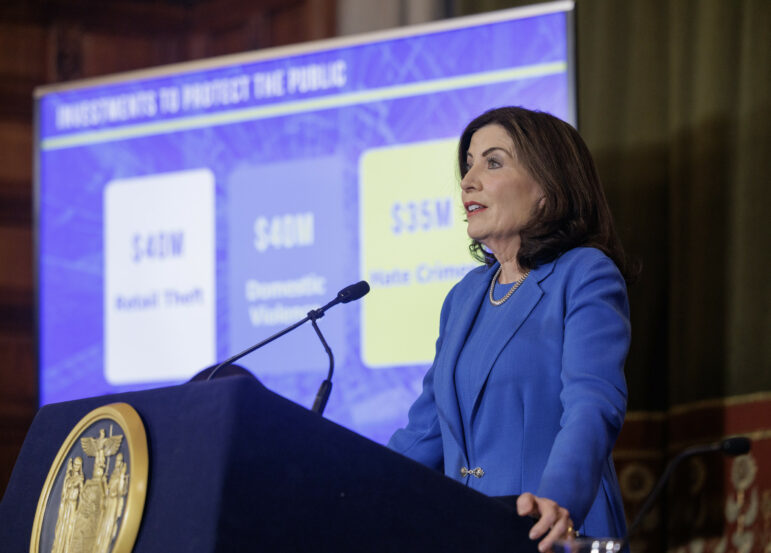As state budget negotiations drag nearly two weeks late, a housing deal seems likely to coalesce—but it’s not there yet, as consequential details remain fluid.

As state budget negotiations drag nearly two weeks late, a housing deal seems likely to coalesce—but it’s not there yet, as consequential details remain fluid.
Speaking to City Limits this week, sources familiar with the negotiating terrain said an agreement is possible that, broadly, incentivizes new housing development through a tax incentive program and introduces new eviction protections for some tenants.
Candis Tall, vice president and political director for the building service workers union 32BJ SEIU, said Thursday that she is “really optimistic that we’re going to get to the right thing.” Doing so would benefit her 100,000 New York City members who need affordable housing options, she added.
Unlike last year, Gov. Kathy Hochul has opened the door to some version of good cause eviction legislation, which has been a priority for tenant advocates since 2019 but has floundered for years in the face of strong opposition from the real estate industry.
“Many of us have made it clear that good cause is an integral part of any housing package that we enact, and I’m glad the governor has been responsive to our needs in that regard,” Deputy Senate Majority Leader Mike Gianaris told City Limits Tuesday.
“The deal for the last couple of years was going to end up at affordable housing development subsidy and tenant protections,” he added. “And so now we’re seeing that being realized.”
But the versions of good cause currently up for debate have broader exemptions than the bill that Brooklyn Senator Julia Salazar and Syracuse Assemblymember Pam Hunter introduced in 2019. This, in combination with talks to allow larger rent increases following renovations in regulated apartments, has drawn backlash from tenant organizations.
“We don’t want to see something that doesn’t protect any tenants,” said Cea Weaver, director of the statewide Housing Justice for All coalition. “We don’t want the Legislature and the governor to pass something that’s really good cause in name only.”
“I don’t want the perfect to be the enemy of the good, but the good needs to be good,” she added.
Salazar and Hunter’s bill would give unregulated tenants a defense against eviction, so long as they adhere to their leases and keep up with rent. Tenants could also challenge a rent hike above 3 percent or 1.5 times the Consumer Price Index (CPI), whichever is greater. Owner-occupied buildings with under four units would be exempt.

Chris Janaro
State Sen. Julia Salazar at a February rally in Brooklyn calling for passage of good cause eviction legislation.By contrast, the governor and legislative leaders are currently debating exempting certain high-cost apartments from good cause, according to multiple sources privy to negotiations, as well as real estate portfolios below a certain unit threshold.
Precise numbers for both are a moving target. Other live items include a multi-year good cause exemption for new construction and some type of geographic qualification—localities outside of New York City would either have the chance to opt in to good cause, or opt out of it.
Parties also seem to be coalescing around specific rent increases before a good cause defense would kick in, more in line with a similar law in California: 5 percent plus the CPI or 10 percent, whichever is lower.
Senate Housing Committee Chair Brian Kavanagh shied away from sharing details on Wednesday, but said that he would like to see the “broadest geographic coverage we can agree on” and that good cause shouldn’t only apply “when the rent is very low.”
Kavanagh also alluded to the possibility of an exemption based on a landlord’s holdings, citing “some sympathy for smaller landlords” that he expects to reflect in the final agreement.
But this didn’t draw excitement from Ann Korchak, board president of the group Small Property Owners of New York. Korchak owns two 10-unit buildings in Manhattan, 60 percent of which are unregulated.
“Every time that there’s some exemption—whether portfolio size or luxury—to me it’s just one more admission that this is a terrible policy,” she said. “That they have to dream up more exemptions to get people on board.”
Good cause “gives the lease holder more rights than the deed holder,” she said, and would effectively limit rents on the market units she uses to subsidize the cost of operating her rent regulated apartments.
Earlier on in the budget process, the Senate announced support for increasing the cost of renovations, known as Individual Apartment Improvements (IAIs), that can go toward a rent increase for stabilized tenants. The current cap is $15,000 over 15 years, and rents can increase 1/168th or 1/180th of the cost, depending on the building size.
The Real Estate Board of New York (REBNY) subsequently floated lifting the cap to $150,000, which was a nonstarter, according to Kavanagh. “We are open to reasonable changes,” he said. “But not excessive changes that are intended to rapidly raise rents and undermine the system.”
Among those pushing for higher allowable rent increases is Queens Senator Leroy Comrie. He said Thursday that tenant advocates and their allies in the legislature are in “fantasy land” when it comes to the true cost of fixing up apartments.
“I’ve repeatedly stated in conference that there is a version of tenant protection that I could get behind,” Comrie added, though he declined to provide specifics.
Sue Susman, a rent stabilized tenant with the Coalition to End Apartment Warehousing, said her group opposes any adjustment to the IAI cap, noting that landlords have been known to fraudulently inflate the cost of improvements. A state audit initiative of IAIs has recovered over $7.4 million in overcharged rent, according to a 2023 report.
The 2019 changes to the rent laws, including the $15,000 IAI cap, made it more difficult for landlords to speculate off of rent stabilized buildings, Susman added, selling and borrowing against them. To retreat from that could be a boon for landlords “without regard to the actual human beings who are living there and what they can afford.”
Tall, of 32BJ, said the union has not taken a stance on IAI adjustments, but is focused on a deal with a tax incentive for development—a job and housing creator for its members—and good cause eviction, which it endorsed for the first time this session.
The union has been involved in negotiations around the latter’s final form.
When it comes to a final deal, “We understand that it may not be perfect,” Tall said. “But if it will make changes for the lives of our members, we’re going to push for it.”
The stakes are high, she added. According to Tall, the union has about 3,000 members who work in New York City but live in Pennsylvania. “That, when I started here at 32BJ in 2013, did not exist,” she said. “And that’s because they’re being priced out of the city.”
A spokesperson for the governor did not reply to specific questions on the status of budget negotiations, but pointed to comments Hochul made to reporters on April 4.

Mike Groll/Office of Governor Kathy Hochul
Gov. Kathy Hochul presenting her executive budget in January.“I want to make sure that people are not abusing our tenants,” Hochul said at the time. “Focus on anti-gouging and what is reasonable for them to have to endure at a time when people are feeling under siege with the cost of living so high.”
A New York City Rent Guidelines Board report released Thursday found that inflation in the metro area increased in 2023, albeit more slowly than the year prior—3.8 percent. Meanwhile, average inflation-adjusted wages fell 6.1 percent year over year.
The same report found that residential evictions increased 195.4 percent in the city in 2023, hitting 12,139. That total is still 28.6 percent lower than the number of evictions in 2019, before the pandemic slowed housing court.
Reached by phone Wednesday, Salazar called for expansive tenant protections in any deal. “We really have a responsibility to ensure that tenants have way more protections against eviction and unjustified rent increases tomorrow than they do today,” she said.
“It sounds really simple,” she added. “But I feel the need to repeat it all the time because there are forces at the table in Albany who seem to be motivated by trying to minimize the number of people who are protected from eviction.”
To reach the reporter behind this story, contact Emma@citylimits.org. To reach the editor, contact Jeanmarie@citylimits.org
Want to republish this story? Find City Limits’ reprint policy here.








